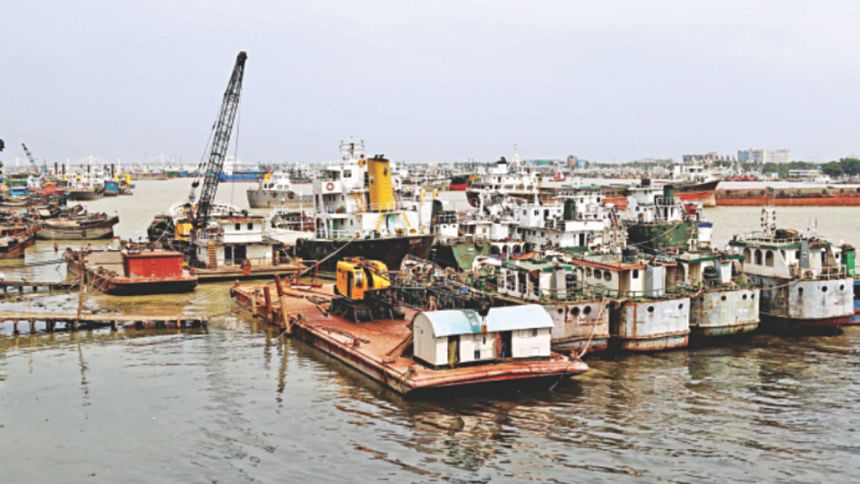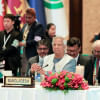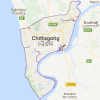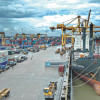Businesses hit hard

Two vessels carrying over 1,00,000 tonnes of wheat, yellow maize and yellow peas from Argentina and Canada arrived at the outer anchorage of the Chittagong Port in the middle of this month.
Before the water transport workers started a wildcat strike since April 20 midnight demanding a pay hike among other things, just about 5,000 tonnes of goods could be unloaded from the two vessels -- MV Mykonos Seas and MV Lara.
But due to the ongoing stalemate, two lighter vessels with these 5,000 tonnes of goods remain stranded at a private jetty on the Karnaphuli river for the last nine days.
For each day's overstay, mother vessels have to pay $15,000 in demurrage.
BSM Group Chairman Abul Bashar Chowdhury, who imported the wheat, yellow maize and peas, yesterday said they were counting a loss of Tk 50 to Tk 60 lakh a day. This includes the cost of demurrage, damage of goods' quality due to overstay and bank interest.
Such a deadlock would disrupt the whole supply chain, he said.
The trouble continues because although the water transport workers lifted their strike on April 26, cargo vessel owners stopped operating their vessels across the country protesting the wage hike proposed by the shipping ministry.
As a result, unloading and transporting of some 14 lakh tonnes of goods from over 60 mother vessels, including the two mentioned above, at the outer anchorage of the Chittagong Port remain uncertain.
Another 7.8 lakh tonnes of goods in 681 lighter vessels remain stranded in various private jetties in Chittagong, Narayanganj, Baghabari, Nogorbari, Bhairob, Ghorashal and other districts, said sources in the Water Transport Cell, a private organisation that coordinates schedules for lighter vessels.
These goods include wheat, raw sugar, poultry feed, urea, gypsum, raw materials like cement clinker, limestone, iron rod and scraps.
On Wednesday however, some industry owners, including Abul Khair Group, Meghna Group, TK Group, Bashundhara, Akij Group and Premier Cement, have managed to resume unloading and transporting from some 26 mother vessels on a small scale with their own lighter and cargo vessels.
Industry owners have only 200 cargo vessels while three organisations of cargo vessel owners have some 3,000.
Power and cement productions have already been hit by the stalemate.
State Minister for Power and Energy Nasrul Hamid in a Facebook post on Wednesday said the non-operation of water vessels was hampering countrywide supply of fuel oil, affecting electricity generation at oil-based power plants.
According to Cement Manufacturers' Association, production in at least 10 cement factories remains fully or partially suspended.
For example, production at Premier Cement factory with a daily capacity of 8,000 tonnes remained completely halted till April 26.
Amirul Hoque, managing director of Premier Cement Mills Limited, said they had to count $10,000 in daily demurrage for each of their three vessels stuck at the anchorage.
“On top of that, we lost market share as our supply chain was affected due to the complete suspension of production for those six days. Who is going to pay for the loss…?”
The factory resumed partial production on April 27 by transporting raw materials with their own small vessels.
WAGE HIKE DEBATE
In 2009, the lowest wage for the transport workers was fixed at Tk 3,000. Following workers' strike in 2013, it was raised by 20 percent to Tk 4,100.
On April 20, Bangladesh Water Transport Workers Federation called the latest strike demanding a minimum monthly wage of Tk 10,000 and also an increase in overtime pay, festival bonus and other benefits.
Following a meeting between workers, owners and ministry representatives on April 26, the workers called off their strike as the ministry proposed to fix Tk 9,000 in minimum wages.
The next day, cargo vessel owners stopped operating their vessels in protest against the hike.
Khorshed Alam, senior-vice president of Bangladesh Cargo Vessel Owners Association, said after the 2009 hike, the next raise was due in 2014. But in 2013, workers forced owners to give a 20 percent increase.
Now they demand a 150 percent hike, which is illogical and impossible for the owners to pay, he added.
“In the last three years, fuel cost has been increased thrice though the vessel fare was not hiked. Though we are not in a position to increase wage this year, we proposed for an increase but the ministry favoured the workers and put pressure on us,” he added.
Terming the owners' decision not to operate vessels “whimsical,” Chowdhury Ashiqul Alam, general secretary of Bangladesh Water Transport Workers Federation, said workers' minimum wage of Tk 9,000 fixed by the ministry was still too little to cope.
“How can a worker do such a risky job without feeding himself? A worker needs at least Tk 3,500 a month for himself. Then how can he run the family with the rest of the money?” he said.
MINISTRY STEP
The shipping ministry yesterday asked the Chittagong Port Authority chairman to sit with all stakeholders. The chairman is expected to hold a meeting to discuss this today, sources said.
Ministry Secretary Ashoke Madhab Roy told The Daily Star that they also sought help from Chittagong Chamber leaders in this regard.
He termed the vessel owners' opposition to the wage hike “illogical”.
“We negotiated to fix the minimum wage at Tk 9,000. This was logical because it is difficult for the workers to do their job with a pay lower than that,” he added.

 For all latest news, follow The Daily Star's Google News channel.
For all latest news, follow The Daily Star's Google News channel. 








Comments